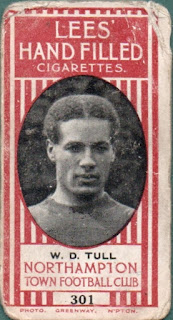301: W. D. Tull, Northampton Town, Lees Hand Filled Cigarettes
This weekend always takes on a rather sombre tone as the country reflects on those who have lost their lives serving in the nation’s armed forces. Football fixtures will all start with a minute’s silence and, in some cases, the tones of ‘The Last Post’ which, regardless of your views on the military, has to be one of the most poignant pieces of music in existence. Across the English leagues clubs will wear special edition kits with the iconic poppy to raise funds for the Royal British Legion. As always there will be an unpleasant Twitter storm regarding certain players’ wishes not to wear the logo which has become weaponised beyond recognition in the age of social media.
The first Remembrance Day was held in 1919 just a year after the armistice was signed to bring the First World War to an end with the poppy emerging as a symbol of reflection following the poem ‘In Flanders Field’ by Canadian military physician John McCrae. Nearly ten million servicemen lost their lives on both sides with a further thirty million wounded or missing in action. Among these were several professional and amateur footballers who served in a variety of roles. The entire Heart of Midlothian squad joined the 16th Royal Scots alongside season ticket holders and other Edinburgh based sportsmen which inspired those south of the border to form the so-called ‘Footballer’s Battalion’ as part of the Middlesex Regiment. Among them were the entire Clapton Orient squad, England international and Boer War veteran Frank Buckley and Northampton Town’s popular forward Walter Tull.
Walter Tull was born in Folkestone to local woman Alice Palmer and Daniel Tull who had settled in the area following his emigration from Barbados. The death of both of his parents at a young age led to him and his brother Edward relocating to Dr Stephenson’s Children’s Home in Bethnal Green in 1898. Two years later Edward was adopted by a Glaswegian family following a performance by the home’s choir and, although the two brothers stayed in reasonably regular touch, Walter remained in London. It was here where his sporting talents came to the fore as he became an integral part of the home’s cricket and football teams. Shortly after beginning his apprenticeship as a printer he was snapped up by local amateur side Clapton FC in 1908. The Tons didn’t lose a game in which Tull appeared and collected the FA Amateur Cup at the end of the 1908/09 season. Tottenham Hotspur had seen enough in this short time and signed Tull as a professional that summer.
Tull was quickly playing first team football at Spurs and impressed in early league and cup appearances with his dribbling and creativity. During a league clash with Bristol City, however, he was the subject of racist abuse from the Ashton Gate crowd and, despite remaining with the North London club for a further season and a half, never made another first team appearance. There is a chance that Spurs’ management were looking to protect Tull from further discrimination although a less forgiving interpretation of this is that they wished to avoid further media scrutiny after the Football Star condemned the actions of the Robins’ supporters. In 1911 Northampton Town signed Tull and he went on to play more than a hundred games for the Cobblers over the next four years firmly establishing himself as a fans’ favourite under the management of Herbert Chapman.
Walter Tull was the first of the Northampton Town playing staff to enlist in the British Army following the outbreak of the First World War and had been promoted three times, to the rank of Lance Sergeant, before his regiment deployed to Pas-de-Calais in Northern France in November 1915. He briefly returned to England the following year suffering with shell shock before being redeployed in September 1916 straight into the Battle of the Somme. Approximately one million men from the British, French and German armies were killed, injured or reported missing in action during the course of the three and a half month battle after which Allied forces had pushed the German Army back a mere 10km along the front. The catastrophic losses and tactical ineptitude displayed by Field Marshal Douglas Haig have seen the battle become a byword for military failure and for Tull to emerge from this theatre of war alive was a considerable achievement.
Early in 1917 Tull again returned to Britain this time to complete officer training. The significant losses experienced in the higher ranks of the British Army in the early stages of the war meant that promotion from the ranks was increasingly common during the conflict. However, the 1914 Manual of Military Law stated that only soldiers “of pure European descent” could be commissioned as officers and command British troops theoretically barring Tull from such a promotion. Nevertheless Tull completed officer training and returned to France as a Second Lieutenant and the first Black British infantry officer. He went on to serve with distinction in the Third Battle of Ypres, better known as Passchendaele, and in Northern Italy where he received a citation for his gallantry during a successful nighttime raid. In the early stages of the German Spring Offensive on 25th March 1918 Walter Tull was ordered to lead an attack on enemy trenches at Favreuil. He was hit by machine gun fire and killed and, despite the best efforts of Leicester Fosse goalkeeper Tom Billingham, his body was not recovered.
Letters of condolence to his brother Edward from both his military comrades and Northampton Town’s directors spoke fondly of Walter Tull as a man, a footballer and a soldier and his bravery during the First World War saw him recommended for the Military Cross. To this day he has yet to receive this award. As soon as the First World War ended the ‘colour bar’ preventing those of non-white heritage from earning promotion to the officer ranks was reintroduced in the British military and stayed in place until 1940. Campaigns for Tull’s family to receive his medal posthumously have continually fallen on deaf ears despite the increasing awareness of his incredible story. What this suggests about the country Tull fought and died for over a century ago is open to interpretation but if and when you take time to reflect this remembrance weekend keep Walter Tull in your thoughts – a true footballing and military pioneer.





Comments
Post a Comment